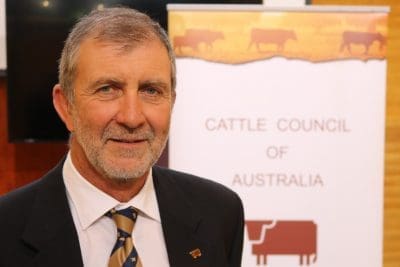CATTLE Council of Australia has welcomed fresh international debate on the best method for measuring the global warming impact of animal agriculture.
As Beef Central published yesterday, the European Union is being lobbied by independent climate scientists to consider alternative models to make sure meat producers are treated fairly.
 Cattle Council President Tony Hegarty said it was reassuring to see the issues Australia’s beef industry faces are shared by producers around the world.
Cattle Council President Tony Hegarty said it was reassuring to see the issues Australia’s beef industry faces are shared by producers around the world.
“It doesn’t matter where they are, producers just want the best science to make sure the job is done well,” Mr Hegarty said.
“In Europe this campaign is being led by eminent climate scientist Professor Myles Allen and his team from Oxford University.
“We’re all asking our governments the same question – is the current model fair and accurate?
“Livestock emissions break down in around 12 years, while emissions from fossil fuel industries can take thousands of years to deplete – it’s a big difference.
“If animal agriculture is lumped with an unfair burden it will impact food production when we need to feed a growing population. Beef is dense in nutrients and the only product we can sustainably mass-produce in many parts of this country.
 “Governments around the world should be having a good, long look at the agreed Global Warming Potential-100 (GWP100) model, and alternatives such as Global Warming Potential star (GWP*).
“Governments around the world should be having a good, long look at the agreed Global Warming Potential-100 (GWP100) model, and alternatives such as Global Warming Potential star (GWP*).
“This follows on from agricultural movements in New Zealand and the United Kingdom for their governments to consider GWP*.
“In Australia the red meat industry has already striving for carbon neutrality by 2030.
“We’ve made great progress, having cut our emission by 56.7% since 2005,” Mr Hegarty said, as detailed in the recent Australian beef industry sustainability update.
